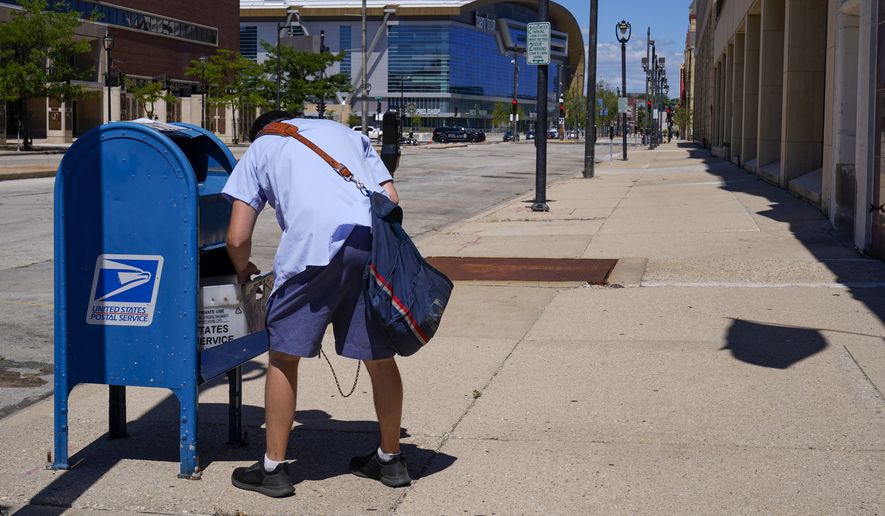A U.S. Postal Service investigation has found no evidence to support a truck driver’s claim that mail handlers were ordered to backdate late mail-in ballots while another 100,000 ballots went “missing” during the presidential election in Wisconsin.
The Washington Times on Tuesday obtained a redacted copy of the USPS inspector general’s report through an open records request.
The truck driver’s allegations, which the IG says is “unfounded,” was one of the more dramatic claims of 2020 voting fraud, helping to feed Trump supporters’ fury over a supposed stolen election.
Former President Donald Trump highlighted the driver’s allegations during his Jan. 6 “Stop the Steal” rally speech, one of nearly 40 unproven election crimes he said happened in battleground states.
“According to eyewitness testimony, Postal Service workers in Wisconsin were also instructed to illegally backdate approximately 100,000 ballots,” Mr. Trump told supporters. “The margin of difference in Wisconsin was less than 20,000 votes.”
Afterward, protesters proceeded to invade the U.S. Capitol to stop Congress from certifying the Electoral Vote for President Biden. Mr. Trump is now on trial in the Senate after the Democrat-controlled House impeached him for inciting an insurrection.
Ethan J. Pease, the Trump-supporting truck driver, worked for a private mail delivery service that had no contractual ties with USPS.
Two days after the election, he anonymously posted a message on social media alleging widespread USPS voting fraud. He later emerged at a press conference and did TV interviews, relating second-hand information from two postal employees.
The inspector general’s nine-page report said investigators interviewed those workers.
“During the investigation, multiple USPS employees and other individuals with knowledge of the allegation were interviewed to determine the validity of the claims against [name deleted],” the report said. “All of those interviewed refuted the claims in the allegation and were not aware of any USPS employee, specifically [deleted] backdating postmarks on ballots … The USPS investigation determined all allegations against [deleted] were false.”
The anonymous post was deleted by the time the probe began, but one of two named USPS employees from the Madison office provided it to the IG.
The worker “expressed concerns about the false information and his personal reputation,” the report said. “[Deleted name] was concerned for the safety of USPS employees at his office, given the political environment.”
The report said investigators later identified the author as Mr. Pease, a temporary driver at United Mailing Services. His route took him to the Madison office to drop off mail from UMS customers.
Mr. Pease did not show up for work on Nov. 5, and he no longer works for UMS. A month later, he appeared at a press conference hosted by The Amistad Project of the Thomas More Society, a conservative civil liberties institute. The project billed Mr. Pease as a whistleblower who would reveal substantial law breaking by USPS workers.
USPS investigators attempted to contact Mr. Pease by phone, at home and through the Amistad Project but did not make contact.
The IG report examined four allegations:
⦁ That USPS dispatched employees to collect ballots after the election from UMS. Mark Kolb, UMS vice president, said all ballots were delivered by Nov. 3.
⦁ That USPS “found” 300,000 ballots on Nov. 4. Mr. Pease said USPS had to be held accountable for such a breach. During his press conference, he changed the number to 100,000 and they were “missing.”
The IG said Mr. Pease was repeating unconfirmed internet reports conveyed to him by USPS employees.
“There is no evidence that USPS located any large amounts of ballots following the election,” the report said. “Pease’s allegation is not based on any direct observations by him or any event demonstrating wrongdoing by a USPS employee.”
⦁ That USPS backdated the postmark on late ballots after Nov. 3 so they would be counted.
The IG said the postmark issue was “irrelevant” since ballots in Wisconsin by law must be handed in by Nov. 3.
⦁ That Mr. Pease had heard that USPS threw out Trump ballots and “he did not bring his concerns to his supervisors at USPS due to what he perceived as USPS hostilities towards President Trump and their evident contempt for the law.”
The IG report does not list any evidence of ballot-tossing.
Phill Kline, Amistad Project director, said Mr. Pease’s allegations and those from two other drivers in other states were “powerful eyewitness accounts of potential ballot fraud on a massive scale.”
The bipartisan Wisconsin Election Commission said in a fraud rebuttal report: “There is no evidence of widespread voter fraud in this or any other Wisconsin election.”
• Rowan Scarborough can be reached at rscarborough@washingtontimes.com.




Please read our comment policy before commenting.